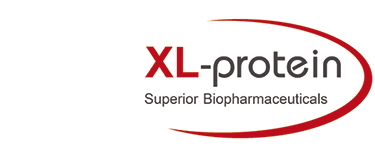XL-protein announces publication of key scientific data on its PASylation® technology
FREISING, GERMANY, August 30, 2013 – XL-protein GmbH announced today that key scientific data have been published in the journal Protein Engineering, Design & Selection (2013, Vol. 26, No. 8, pp. 489–501, 2013). The Open Access Publication “PASylation: a biological alternative to PEGylation for extending the plasma half-life of pharmaceutically active proteins” is also available for download at XL-protein’s web site (http://www.xl-protein.com/publications.html).
A major limitation of biopharmaceutical proteins is their fast clearance from circulation via kidney filtration which strongly hampers efficacy in human therapy. XL-protein has developed conformationally disordered polypeptide chains with expanded hydrodynamic volume comprising the small residues Pro, Ala and/or Ser (PAS). PAS sequences are hydrophilic, uncharged, genetically encodable amino acid polymers with biophysical properties very similar to poly-ethylene glycol (PEG), whose conjugation to drugs is a well known method for plasma half-life extension.
In contrast, beside chemical coupling PAS polypeptides offer fusion to a therapeutic protein on the genetic level, permitting production of fully active proteins in E. coli and other widely used host organisms (including cell culture secretion) without any in vitro modification steps. Importantly, PAS polypeptides are biodegradable, thus avoiding organ accumulation, while showing stability in serum and lacking toxicity or immunogenicity in animals. The publication describes that PASylation® furnishes typical biologics, such as interferon, growth hormone or antibody Fab fragments, with considerably prolonged circulation in vivo.
This work is complemented by another publication “High-yield production of PASylated human growth hormone (hGH) using secretory E. coli technology” that has appeared in the journal BioProcess International (2013, Vol. 11, No. 4, pp. 30–38) and is also available for download at XL-protein’s web site.
“PASylation® offers unique advantages, that is, surprisingly similar biophysical behavior compared with PEGylation, strong and tunable PK extending effects and conservation of high target-binding activity,” stated Uli Binder, CTO of XL-protein GmbH.
Arne Skerra, CEO of XL-protein GmbH, said: “PASylation® enables the preparation of biologically and/or pharmaceutically functional proteins with prolonged and enhanced in vivo activity, which constitutes a bottleneck in current biological drug development and opens exciting commercial opportunities.”
XL-protein’s proprietary PASylation® technology can be applied both to existing biologics, yielding biobetters, or to innovative therapeutic proteins or peptides, leading to tunable prolonged plasma half-life by a factor 10-100 as demonstrated in numerous animal studies up to now.
![]()
Download full press release
